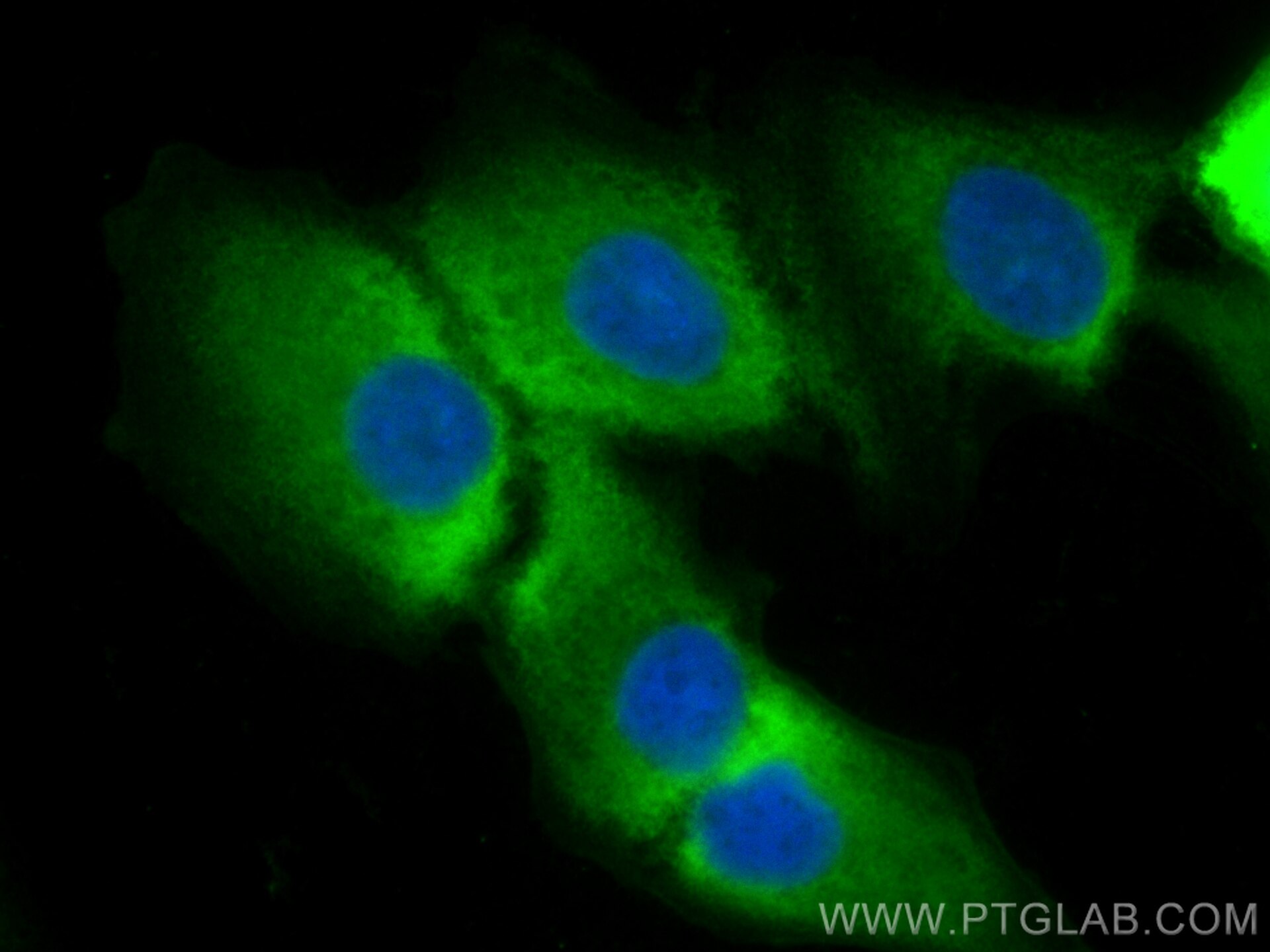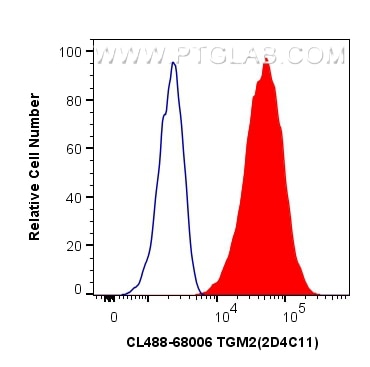Tested Applications
| Positive IF/ICC detected in | A549 cells |
| Positive FC (Intra) detected in | HeLa cells |
Recommended dilution
| Application | Dilution |
|---|---|
| Immunofluorescence (IF)/ICC | IF/ICC : 1:50-1:500 |
| Flow Cytometry (FC) (INTRA) | FC (INTRA) : 0.80 ug per 10^6 cells in a 100 µl suspension |
| It is recommended that this reagent should be titrated in each testing system to obtain optimal results. | |
| Sample-dependent, Check data in validation data gallery. | |
Product Information
CL488-68006 targets TGM2 in IF/ICC, FC (Intra) applications and shows reactivity with human samples.
| Tested Reactivity | human |
| Host / Isotype | Mouse / IgG2a |
| Class | Monoclonal |
| Type | Antibody |
| Immunogen |
CatNo: Ag7462 Product name: Recombinant human TGM2 protein Source: e coli.-derived, PET28a Tag: 6*His Domain: 1-349 aa of BC003551 Sequence: MAEELVLERCDLELETNGRDHHTADLCREKLVVRRGQPFWLTLHFEGRNYEASVDSLTFSVVTGPAPSQEAGTKARFPLRDAVEEGDWTATVVDQQDCTLSLQLTTPANAPIGLYRLSLEASTGYQGSSFVLGHFILLFNAWCPADAVYLDSEEERQEYVLTQQGFIYQGSAKFIKNIPWNFGQFEDGILDICLILLDVNPKFLKNAGRDCSRRSSPVYVGRVVSGMVNCNDDQGVLLGRWDNNYGDGVSPMSWIGSVDILRRWKNHGCQRVKYGQCWVFAAVACTVLRCLGIPTRVVTNYNSAHDQNSNLLIEYFRNEFGEIQGDKSEMIWNFHCWVESWMTRPDLQP Predict reactive species |
| Full Name | transglutaminase 2 (C polypeptide, protein-glutamine-gamma-glutamyltransferase) |
| Calculated Molecular Weight | 77 kDa |
| Observed Molecular Weight | 80 kDa |
| GenBank Accession Number | BC003551 |
| Gene Symbol | TGM2 |
| Gene ID (NCBI) | 7052 |
| ENSEMBL Gene ID | ENSG00000198959 |
| RRID | AB_2923856 |
| Conjugate | CoraLite® Plus 488 Fluorescent Dye |
| Excitation/Emission Maxima Wavelengths | 493 nm / 522 nm |
| Form | Liquid |
| Purification Method | Protein A purification |
| UNIPROT ID | P21980 |
| Storage Buffer | PBS with 50% glycerol, 0.05% Proclin300, 0.5% BSA, pH 7.3. |
| Storage Conditions | Store at -20°C. Avoid exposure to light. Stable for one year after shipment. Aliquoting is unnecessary for -20oC storage. |
Background Information
Transglutaminase 2 (TGM2) is a ubiquitous and multifunctional calcium-dependent enzyme belonging to the transglutaminase family. It is best known for its canonical activity of catalyzing the cross-linking of proteins by forming stable ε-(γ-glutamyl)lysine isopeptide bonds, which contributes to extracellular matrix stabilization and wound healing. Beyond this, TGM2 exhibits GTPase activity, allowing it to function as a signaling G-protein in intracellular processes. It is implicated in a wide range of physiological functions, including cell adhesion, proliferation, and apoptosis, as well as pathological conditions such as celiac disease, fibrosis, neurodegenerative disorders, and cancer metastasis, where its dysregulated expression often contributes to disease progression.
Protocols
| Product Specific Protocols | |
|---|---|
| FC protocol for CL Plus 488 TGM2 antibody CL488-68006 | Download protocol |
| IF protocol for CL Plus 488 TGM2 antibody CL488-68006 | Download protocol |
| Standard Protocols | |
|---|---|
| Click here to view our Standard Protocols |






